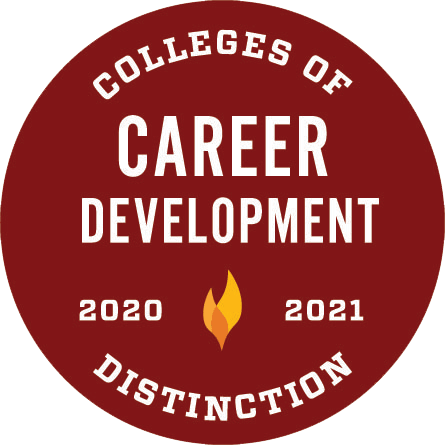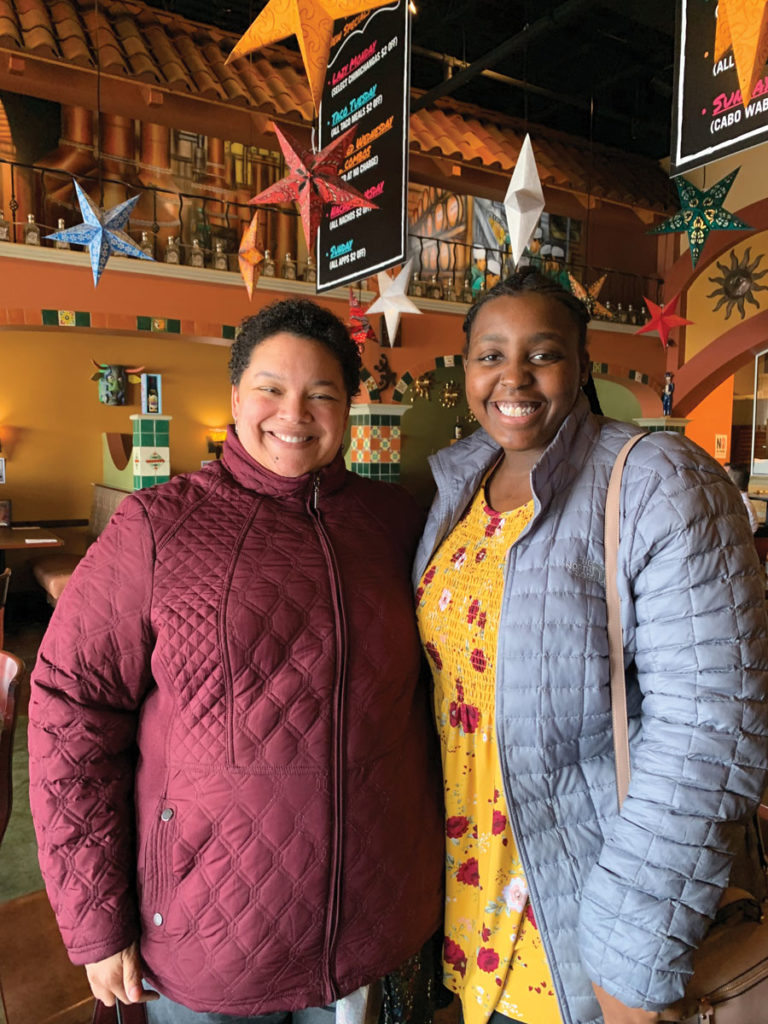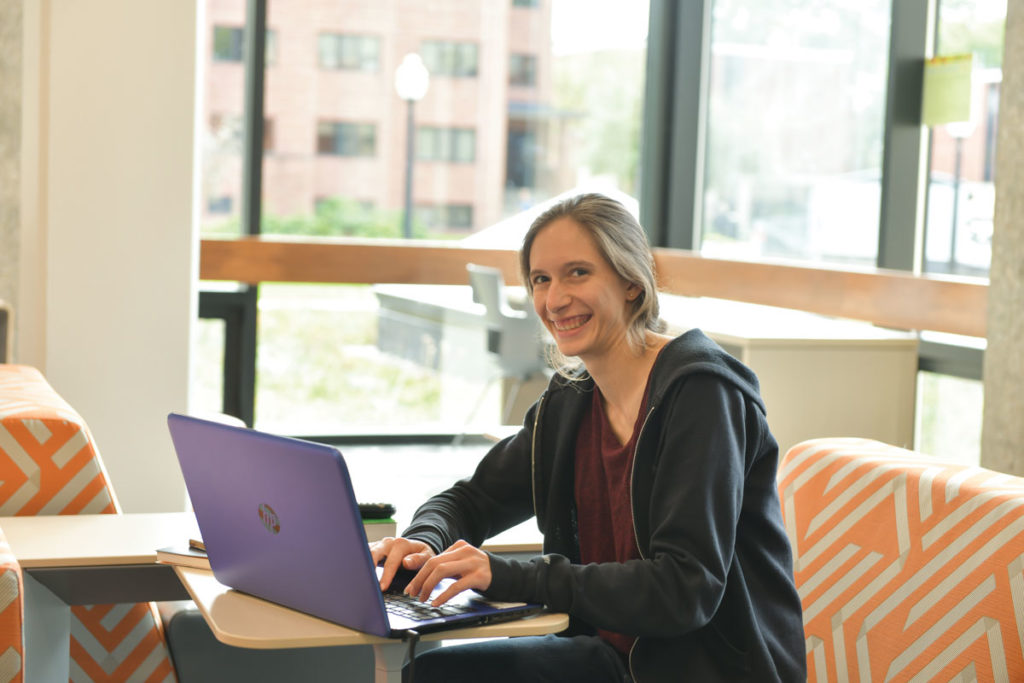A Guide for the Journey
The Boerigter Center for Calling and Career helps students — and alumni — discover and connect tools, talents and opportunities for life after graduation.
The basic pitch for the Boerigter Center for Calling and Career sounds deceptively simple: “We’re here to help students figure out everything from finding a major to finding a job and everything in between,” said Shonn Colbrunn ’94, executive director.
As with most things, though, the reality is more complicated than it sounds. The Boerigter Center is a growing network that encompasses the Center for Leadership as well as academic and health professions advisors. It works in close concert with the Office of Alumni and Family Engagement to serve Hope’s vast network of 35,000 alumni.

The Boerigter Center has garnered national recognition twice within the past year. Last spring, the center was named a Program of Distinction by Colleges of Distinction for “superior ability to think ahead about how their students will succeed after they graduate.” Earlier this semester, the Boerigter Center and the college’s Van Wylen Library shared the 2021 group Innovation Award from Commission for Career Services of the American College Personnel Association (ACPA) for a collaborative training initiative for students.
And, as we’ll see, it isn’t resting on its success, but is poised to embrace the future with a tenacious commitment to adaptation and innovation.
The Student Experience
The Boerigter Center was launched in fall 2018 with support from SoundOff Signal in honor of George ’61 and Sibilla Boerigter. Integrated into the academic program of the college, it includes and expands on the work of Hope’s former Career Development Center in combination with staff from the college’s academic advising program along with Alumni and Family Engagement. Its long-term goal is to work with every student at Hope before they graduate — and they’re well on the way, engaging with more than 50 percent of students during the 2019-20 school year.
The center’s location on the first floor of the DeWitt Center is a main thoroughfare on campus, designed so passersby literally walk through the Boerigter workspace. Staff from the center also present in First-Year Seminars and other courses; last year, they reached more than 1,400 students with information about calling and career.
These two scenarios — location and classroom visits — have allowed Boerigter Center staff to build widespread awareness across campus, but the team aims to engage with each student in a deeper way. In their freshman and sophomore years, this interaction is largely centered around helping students discern their passions, personalities, skills, dreams and opportunities.
“Especially for freshmen and sophomores, we really lean in on that discernment side of things and being there to open the conversation about calling,” said Colbrunn. “If you can find the spot where your gifts and strengths overlap with your interests and then overlap with something that you can get a paycheck to do, then we’re on to something.”
The Boerigter Center helps students discern their calling with tools like the StrengthsQuest assessment and with PathwayU, a means of matching students’ interests and abilities with potential careers. Another part of the process is DiscoverWork, a program that places students (usually freshmen) with employers, often but not exclusively alumni, across the country to spend one or two days job shadowing.
Hope College junior Marketea Abbott (pictured on right), a social work major from Detroit, Michigan, says that the DiscoverWork program was her favorite aspect of the Boerigter Center during her first two years at Hope.
“My freshman year I went to Atlanta to job shadow at Junior Achievement of Georgia, and my sophomore year I went to Milwaukee, Wisconsin, to job shadow at Brooks Law,” Abbott said. “I learned exactly what I want to do with my degree, and it made me so much more passionate about my specific field of social work.”
She also gained lifelong mentors: “I still connect with my DiscoverWork hosts multiple times a year, and it’s amazing to know that I have people to uplift me and realign me when life gets crazy.”
Grace Charnesky ’20, now an issue resolution team co-chair at General Motors, was a frequent visitor to the Boerigter Center. “I participated in two DiscoverWork opportunities, shadowing engineers at Haworth in Holland, Michigan, and the National Renewable Energy Lab in Golden, Colorado. Both experiences gave me a better understanding of what I wanted to achieve with my degree,” she said.
If students can’t manage one- or two-day visits, Boerigter Center staff can help set up phone calls for informational interviews with alumni in fields that interest students. The option has been especially popular during COVID-19, when many workplaces are restricting visitors.
After spending time on discernment, the Boerigter Center shifts into helping students prepare for their callings during their sophomore and junior years: figuring out which major to declare, identifying research to pursue, pinpointing leadership skills to develop, and preparing résumés, head shots and LinkedIn profiles. In September 2020, a virtual “Career Camp” attracted more than 275 students to multiple virtual workshops and an intensive résumé review process.
“As I started searching for internships, the staff at Boerigter helped me proofread my résumé and cover letters, practice with mock interviews, and learn how to network with others in my field. Attending career fairs gave me a chance to learn about different industries and decide what I was most interested in pursuing,” Charnesky said.
Moving into the typical senior year, Boerigter shifts again, this time into helping students pursue the opportunities for which they’ve prepared. For most students, this includes job applications, interviews and networking.
If all goes well, students graduate from Hope College with a leg up on their postgraduate plans, whether career, graduate school or volunteer service. But the Boerigter Center’s involvement doesn’t stop after four years.
Alumni Engagement
The Office of Alumni and Family Engagement is one of the Boerigter Center’s closest on-campus partners.
“Our partnership is so important to us that we develop programs together and share resources, including a number of staff who work with both the Boerigter Center and Alumni and Family Engagement,” said Scott Travis ’06, executive director of alumni engagement. “We share a front desk on the first floor of DeWitt — and we are working on new partnerships that are unique within higher education.”
The offices partner by involving alumni in training and advising students. “Because of the coronavirus, we’ve been pushed to taking all of our preparation workshops, like how to write a résumé or interviewing tips, and doing them online,” said Colbrunn. “It actually created a perfect opportunity, because we decided to pull in alumni to every one of these workshops to share their expertise.”
With in-person events, Boerigter staff were limited to working with local or regional alumni; since the mandatory shift to remote delivery, however, they’ve been able to dramatically expand their network of alumni experts. And they plan to keep it that way.
The Boerigter Center also sets aside a portion of its time for appointments with alumni who want help navigating career changes later in life. “We have an open invitation to alumni to call us and we’ll get started with you,” Colbrunn said.
Charnesky (pictured right), who majored in engineering and minored in Mandarin, relied on the Boerigter Center’s career services. “When I started looking for jobs after college, the Boerigter Center helped me find ways to improve my applications and fine tune my interview responses,” she said. “They supported me through every stage of my career discernment, and I can’t recommend meeting with them enough.”
Lunch-and-learns and other virtual events are also tailored specifically to alumni audiences.
“Career development is an important part of a lifelong relationship that all alumni are invited to have with their alma mater,” said Travis. “We do alumni engagement from the lens of career much more today than we used to because it’s so relevant in people’s lives.”
In early 2020, the Office of Alumni and Family Engagement and the Boerigter Center together unveiled The Hope College Connection, a new digital platform that connects Hope alumni to other alumni as well as to current Hope students. It’s a sort of combination alumni directory meets social network meets career networking platform.
“That is where alumni can engage and network for the benefit of students — but it’s also for the benefit of fellow alumni, because they’re able to get on the site and find others who work in the same field and message each other for connections or advice,” said Colbrunn.
Currently, The Hope College Connection has approximately 3,000 active users that encompass 50 states, 30 countries and more than 70 areas of industry expertise.
“The Hope College Connection is just as much about making career-related introductions between alumni as it is about introducing them to students. It also serves as the alumni directory, so it can benefit those who are looking to get in touch for other reasons,” Travis said.
What’s Next?
As the Boerigter Center turns toward the future, both Colbrunn and Travis said that they’re working together to figure out ways to increase and expand career support and lifelong learning resources for alumni.
“We’re listening to what our alumni want, and we’re committed to investing in our partnership with the Boerigter Center for the benefit of our alumni,” said Travis.
They are also working together to improve and create new spaces for students, alumni and employers to connect on campus, with plans to renovate the former Kletz in the lower level of the DeWitt Center for use in advising, career development, alumni and family engagement, and the Center for Leadership.
And they’re continuing to explore new opportunities to deliver information via video, as well as planning to capitalize on some of the lessons learned from their aggressive shift to digital programming during COVID-19. They’re offering new resources to distinguish Hope graduates from others — things like certification in Tableau (a popular data visualization software) and digital badges in critical thinking and intercultural fluency — and they’re partnering closely with the Center for Diversity and Inclusion to improve their services to students of color and other underrepresented students.
The Boerigter Center has changed and expanded dramatically since its inception just a few short years ago, and they’re building on that foundation to carry their momentum into the future. In other words, as much as is already happening for students and alumni through the Boerigter Center, there’s a lot more in the works.




